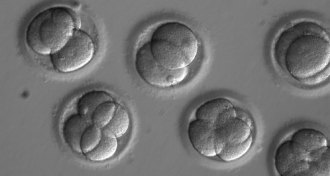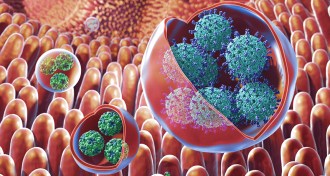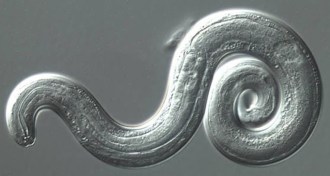Life
Sign up for our newsletter
We summarize the week's scientific breakthroughs every Thursday.
-
 Genetics
GeneticsResearchers say CRISPR edits to a human embryo worked. But critics still doubt it
Researchers say that they have confirmed CRISPR/Cas9 edits of a heart disease–causing version of a gene, but critics still have doubts.
-
 Archaeology
ArchaeologyThe debate over people’s pathway into the Americas heats up
Defenders of an ice-free inland passage for early Americans make their case.
By Bruce Bower -
 Life
LifeNasty stomach viruses can travel in packs
Contained clusters of rotavirus and norovirus caused more severe infections in mice than the same viruses working solo.
-
 Health & Medicine
Health & MedicineZika may harm nearly 1 in 7 babies exposed to the virus in the womb
A new CDC report tallies neurological and developmental problems, in addition to birth defects, possibly due to Zika in U.S. territory–born babies.
-
 Neuroscience
NeuroscienceFootball and hockey players aren’t doomed to suffer brain damage
A comprehensive look at the brains and behavior of retired professional football players and retired hockey players finds no signs of early dementia.
-
 Animals
AnimalsThis killifish can go from egg to sex in two weeks
The fastest known maturing vertebrate in the lab is even faster in the wild.
By Susan Milius -
 Genetics
GeneticsThe first detailed map of red foxes’ DNA may reveal domestication secrets
Thanks to a newly deciphered genome of red foxes, researchers have pinpointed regions in the animals’ DNA linked to taming them.
-
 Health & Medicine
Health & MedicineScientists successfully transplant lab-grown lungs into pigs
Pigs implanted with lab-grown lungs recovered from surgery with no breathing problems.
-
 Health & Medicine
Health & MedicineRat lungworm disease is popping up in the mainland United States
A disease caused by a parasite endemic to Asia sickened at least 12 people in eight states in the continental United States from 2011 to 2017.
-
 Genetics
GeneticsThe ‘language gene’ didn’t give humans a big leg up in evolution
Scientists have long debated the role of a gene called FOXP2 in recent human evolution.
-
 Genetics
GeneticsIndonesia’s pygmies didn’t descend from hobbits, DNA analysis suggests
Short people living on the Indonesian island of Flores don’t appear to have DNA from controversial, small-bodied Stone Age hominids called hobbits.
By Bruce Bower -
 Paleontology
PaleontologyFossil teeth show how a mass extinction scrambled shark evolution
The dinosaur-destroying mass extinction event didn’t wipe out sharks, but it did change their fate.